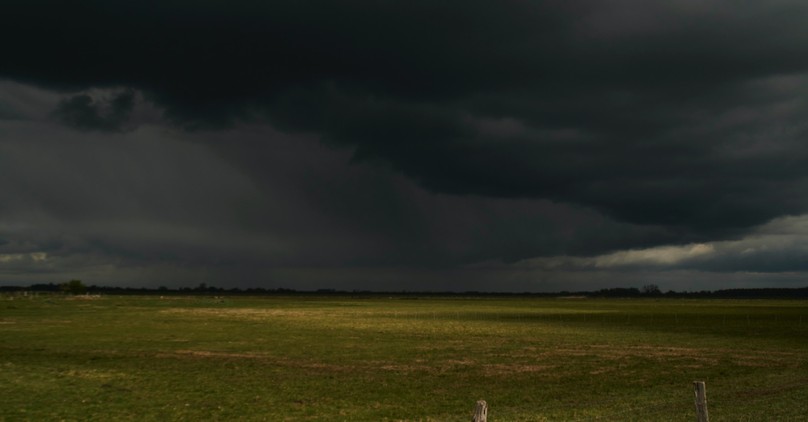
I told my mountain to be thrown into the sea (Mark 11:22-23). I believed God could make it happen—would make it happen.
But He didn’t. The mountain remains stalwart to its roots. This storm rages on. My heart continues fraying at the seams.
This leaves me wondering, Is the mustard-seed faith hinged on spiritual accolades that I have overlooked, misunderstood, or never earned? Is my faith in what I hope for useless if it doesn’t align with God’s will? … and what does God think of me for questioning Him like this?
Can you relate? Have you ever prayed for a relationship to be mended, but the other party remains cold and distant? For a loved one to be healed who left too soon? For an answer that was carried away with the wind?
If you can, you are in good company—and by “good,” I mean familiar, relatable, empathetic company. After all, if you answered yes to any of the above questions, I imagine you aren’t in a place where life seems, let alone feels, good.
Frankly, I don’t have much spiritual wisdom regarding my situation. I’m in the eye of my own storm and don’t have hindsight's skills and knowledge. In other words, this article won’t fix your crisis, yet it is my prayer that God grants us mercy as we navigate our broken seasons together, asking questions while believing somehow, some way, our God is still kind, present, and readily available.
So let’s grab tissues, a cup of coffee (with all the cream and sugar your heart pleases), and scrounge for a few rays of light as we trudge our dark tunnels together.
Perhaps My Mountain Means Something More
I looked for extra insight into Mark 11:22-23 (NIV): “Have faith in God,” Jesus answered. “Truly I tell you, if anyone says to this mountain, ‘Go, throw yourself into the sea,’ and does not doubt in their heart but believes that what they say will happen, it will be done for them.”
Bengel’s Gnomon, a praised 18th-century commentary centered on the New Testament, considers that the mountains are God’s, “which human culture does not reach.” This perspective leads me to believe that my definition of the mountains has been wrong. The mountains aren’t my storm, the big, bad thing standing in my way that should be drowned in the depths of the sea. The mountains are the goodness of God, a goodness so good that human culture can’t bring such glory to Earth on its own.
What if I have been so focused on God solving my problem that I haven’t invited His goodness to be the solution? What if I have invited Him into my prayer only to treat Him like my plumber? He’s allowed in my house to fix the leak, but He is escorted to the door once my satisfaction is restored… and I will still grumble about the speed of His service or what it might cost my convenience.
Perhaps I can change how I pray for my heartbreak. Rather than telling God to throw it into the sea, I can invite the mountaintops of God’s goodness to kiss the earth, to meet me in my sorrow. And maybe then my situation won’t necessarily be resolved by worldly standards but will make room for light and love and forgiveness and hope.
Will you try this prayer shift with me?
Perhaps I Have Ignored Verse 25
Admittedly, I know I have ignored Mark 11:25 (NIV): “And when you stand praying, if you hold anything against anyone, forgive them, so that your Father in heaven may forgive you your sins.”
It’s easy to ask God to solve our problems without confessing that we could be the problem itself. Ugh, tough stuff.
Granted, I believe God understands how challenging it is for us to forgive others. He’s attuned to human nature with an empathy and understanding we can’t fathom. And I believe forgiveness can be an ongoing process, almost like a renewal of our spirit to give bits and pieces of love where we once thought impossible.
But if we are harboring willful hatred in our hearts, it’s hard to be angry at God if it seems He isn’t dissolving our storms. Just as we don’t reward our children for hateful behavior for their own good, why would our Good Father reward our unwillingness to forgive? Is it safe to say that a believer housing willful hatred in his/her heart doesn’t have the correct perspective on faith to claim a mountain be moved?
Perhaps I can—better yet, I should—take inventory of my life, of relationships where I am harboring ill will, and repent of my bitterness and hatred. (I’ll admit a few faces automatically pop into my mind, which points to my guilt I now can’t ignore.)
Will you try this self-reflection with me?
Perhaps My Vision Has Been Surface-level
A few months ago, my church’s music director had our worship team play an old hymn, "Be Thou My Vision." It's a 6th-century Irish hymn that was new for this born-and-raised Southern Baptist gal, yet its lyrics have faithfully hummed in my heart ever since. The more I think through each line (full lyrics below), the more I can’t help but wonder if my prayer life, my vision of what my storms are and how they are affecting me, has been surface-level. I have been the sole vision of my prayer life. It has been all about me.
I’m praying for God to remove my mountains. I’m begging Him to drown my crises in the sea. But I’m thinking nothing of Him, of God as a friend who cares so deeply for me that He longs to be more than a genie in a bottle. It would be easy to snap His all-powerful fingers and give me what I want. Instead, He loves me enough to strive with me, sit with me, and make me something more, something better—even when it hurts.
He loves me too much to simply give me what I want when I want. He loves me enough to help me become just like Him. Could we ask for a more loving, humble God?
Perhaps you can meditate on the lyrics below and see if rather than simply asking for your mountains to be moved, you take time to love the One who made them, even the jagged, rocky mountains, because He loved you first and gave Himself for us all:
Be Thou my vision, O Lord of my heart
Naught be all else to me, save that Thou art
Thou my best thought, by day or by night
Waking or sleeping, Thy presence my light
Be Thou my wisdom, and Thou my true word
I ever with Thee and Thou with me, Lord
Thou my great Father, and I Thy true son
Thou in me dwelling and I with Thee one
Riches I heed not, nor vain, empty praise
Thou mine inheritance, now and always
Thou and Thou only first in my heart
High King of heaven, my treasure Thou art
High King of heaven, my victory won
May I reach heaven's joys, O bright heaven's sun
Heart of my own heart, whatever befall
Still be my vision, O ruler of all
Heart of my own heart, whatever befall
Still be my vision, O ruler of all
“You, Lord, are forgiving and good, abounding in love to all who call to you.” Psalm 86:5 (NIV)
Photo Credit: ©Rainer Gelhot/Unsplash



